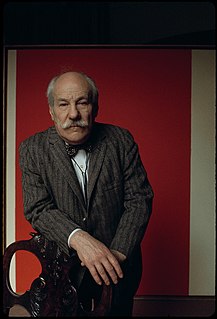A Quote by Sophocles
A man who deals in fairness with his own, he can make manifest justice in the state.
Related Quotes
We will never know peace in the world without balance. And we will never know balance without justice for all. Yet, justice exists only where there is fairness and equality -- when every man and country is treated and viewed equally. My father believes that there is no such thing as justice because all his life he has witnessed the tipping of the scales. We must change this widespread mentality by making equality a reality, not just something we read and hear about on the TV and in literature.
Man is the individualised expression or reflection of God imaged forth and made manifest in bodily form. How is it, then, I hear it asked, that man has the limitations that he has, that he is subject to fears and forebodings, that he is liable to sin and error, that he is the victim of disease and suffering? There is but one reason. He is not living, except in rare cases here and there, in the conscious realisation of his own true Being, and hence of his own true Self.
The essence of justice is mercy. Making a child suffer for wrong-doing is merciful to the child. There is no mercy in letting the child have its own will, plunging headlong to destruction with the bits in its mouth. There is no mercy to society nor to the criminal if the wrong is not repressed and the right vindicated. We injure the culprit who comes up to take his proper doom at the bar of justice, if we do not make him feel that he has done a wrong thing. We may deliver his body from the prison, but not at the expense of justice nor to his own injury.
There is a man who exists as one of the most popular objects of leadership, legislation, and quasi-literature in the history of all men. . . . This man, that object of attention, attack, and vast activity, cannot make himself be heard, let alone understood. He has never been listened to. . . . That man is Black and alive in white America where the media of communication do not allow the delivery of his own voice, his own desires, his own rage.
[T]he mass-man sees in the State an anonymous power, and feeling himself, like it, anonymous, he believes that the State is something of his own. Suppose that in the public life of a country some difficulty, conflict, or problem presents itself, the mass-man will tend to demand that the State intervene immediately and undertake a solution directly with its immense and unassailable resources. This is the gravest danger that to-day threatens civilisation: State intervention; the absorption of all spontaneous social effort by the State.







































